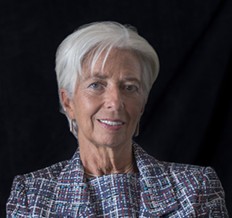 International Monetary Fund managing director Christine Lagarde delivered a thoughtful presentation at a Bank of England conference several weeks ago. Her presentation is worth a second look by central bankers who see no role for digital currencies and are threatened by them.
International Monetary Fund managing director Christine Lagarde delivered a thoughtful presentation at a Bank of England conference several weeks ago. Her presentation is worth a second look by central bankers who see no role for digital currencies and are threatened by them.
For an establishment banking leader, she was surprisingly candid about central monetary challenges and positive about cryptocurrency.
Lagarde’s presentation looked at the possible impact of three innovations – virtual currencies, new financial models and artificial intelligence.
Challenge of virtual currencies
Her view of digital currencies is surprisingly open:
For now, virtual currencies such as Bitcoin pose little or no challenge to the existing order of fiat currencies and central banks. Why? Because they are too volatile, too risky, too energy-intensive, and because the underlying technologies are not yet scalable. Many are too opaque for regulators; and some have been hacked.
But many of these are technological challenges that could be addressed over time. Not so long ago, some experts argued that personal computers would never be adopted, and that tablets would only be used as expensive coffee trays. So I think it may not be wise to dismiss virtual currencies.
 She says citizens may soon choose virtual currencies because they “may one day be easier and safer than obtaining paper bills, especially in remote regions. And because virtual currencies could actually become more stable.”
She says citizens may soon choose virtual currencies because they “may one day be easier and safer than obtaining paper bills, especially in remote regions. And because virtual currencies could actually become more stable.”
As fintech impacts the financial services industry, she believes cryptocurrency can meet the need for new payment services in a growing, decentralized global economy.
This new economy is built on peer-to-peer transactions and micro-payments often sent across borders.
Citizens may one day prefer virtual currencies, since they potentially offer the same cost and convenience as cash—no settlement risks, no clearing delays, no central registration, no intermediary to check accounts and identities. If privately issued virtual currencies remain risky and unstable, citizens may even call on central banks to provide digital forms of legal tender.
So, when the new service economy comes knocking on the Bank of England’s door, will you welcome it inside? Offer it tea—and financial liquidity?
New financial models
 Lagarde sees the near future filled with new financial models as a result of the impact of fintech with its six-month product cycles and constant software updates.
Lagarde sees the near future filled with new financial models as a result of the impact of fintech with its six-month product cycles and constant software updates.
Banking is becoming unbundled. She sees a near future where consumer is making minimal amounts in their e-wallets while the majority of funds are invested in peer-to-peer loans using artificial intelligence and big data for credit scoring.
She wonders if central banks can set effective monetary policies in this new environment. Can regulators keep up with the demand for oversight of new services? What about the social media company that enables payments without managing an active balance sheet?
Lagarde says, “regulators may need to become experts in assessing the soundness and security of algorithms. Easier said than done.”
Technology knows no borders: what is home, what is host? How can we avoid regulatory arbitrage and a race to the bottom? This is about the IMF’s mandate for economic and financial stability, and the safety of our global payments and financial infrastructure.
Artificial intelligence impact
 The IMF chief notes 90% of big data has been generated in the past two years.
The IMF chief notes 90% of big data has been generated in the past two years.
Humans will still be needed and she said central bankers must communicate monetary policy and tell their story more effectively. It’s all about accountability.
Lagarde wrapped up her presentation saying “I believe that we—as individuals and communities—have the capacity to shape a technological and economic future that works for all. We have a responsibility to make this work.”
Read Christine Lagarde’s speech to the Bank of England for more thoughtful insight into cryptocurrency, fintech and the future of financial services.








LET’S CONNECT